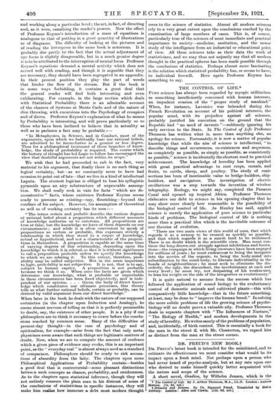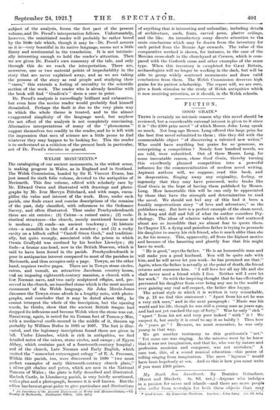DR. FREUD'S NEW BOOK.t
DR. FREUD'S latest book is intended for the uninitiated, and to estimate its effectiveness we must consider what would be its impact upon a fresh mind. Not perhaps upon a person who had never heard of psycho-analysis, but at any rate upon one who desired to make himself quickly better acquainted with the nature and scope of the science.
A short novel, Gradiva, by Wilhelm Jensen, which is the • The Control-0.1'14e. By Arthur Thomson, MA., LLD. London : Andrew Melrose. [7s. ed. net.) t Delusion and Dreams. By Dr. Sigmund Freud. Translated by Helen
Downey. London Alien and Litwin. 112a. ed. netj , .
subject of -the analysis, forms the first part of the present volume, and Dr. Freud's interpretation follows. Unfortunately, however, the uninitiated reader will probably bo rather bored by the little tale which, though it may be—Dr. Freud assures us it is—very beautiful in its native language, seems not a little flimsy and sentimental in the translation. It is not intrinsic- ally interesting enough to -hold the reader's attention. Then we are given Dr. Freud's own summary of the tale, and only through this do we reach the interpretation. There are, moreover, one or two material points of improbability in the story that are never explained away, and as we are taking the persons of the story as real people and studying their " cases," this extends a feeling of unreality to the scientific section of the work. The reader who is already familiar with the book will find " Gradiva's " dress a case in point.
Dr. Freud's analysis is exceedingly brilliant and exhaustive, but even here the novice reader would probably find himself dissatisfied. Perhaps the fault is due to the very plain way in which the whole theme is treated, and to the almost exaggerated simplicity of the language used, but anyhow the net effect of the analysis is not completely convincing. Alternative interpretations of many of the " phenomena " suggest themselves too readily to the reader, and he is left with the impression that men of science are a little prone to find w;iatever they may happen to be looking for. This the reader is to understand as a criticism of the present book in particular, not of Dr. Freud's theories in general.



































 Previous page
Previous page